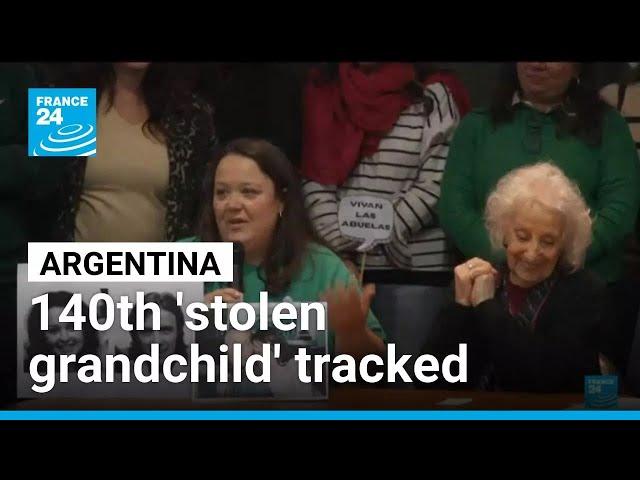In the decades following Argentina’s brutal military dictatorship from 1976 to 1983, thousands of children were forcibly taken from their disappeared parents and illegally adopted, erasing their true identities. Now, a renewed wave of efforts is underway to locate and restore these stolen grandchildren to their biological families. The New York Times investigates the ongoing search-a complex and emotional journey marked by legal battles, scientific advancements in genetic testing, and the tireless work of human rights organizations dedicated to uncovering the hidden legacies of the nation’s darkest chapter.
The Untold Stories Behind the Quest to Recover Stolen Grandchildren in Argentina
Beneath the surface of Argentina’s turbulent history lies a heartbreaking narrative of families torn apart by a sinister campaign during the military dictatorship known as the Dirty War. Thousands of children were taken from their parents-primarily political dissidents-and illegally adopted by families aligned with the regime. Today, the search for these stolen grandchildren is not only a quest for identity but a profound struggle for justice. Human rights organizations and survivors relentlessly pursue truth, piecing together fragments of falsified documents, clandestine birth records, and eyewitness accounts, confronting decades of silence enforced by fear and repression.
The path to recovery is fraught with emotional and legal hurdles, as many of these grandchildren, now adults, are unaware of their origins or resist reopening wounds. Collaborative efforts between forensic teams, activists, and governmental bodies have led to groundbreaking discoveries, supported by advances in DNA testing and archival research. The following table summarizes key organizations involved in this ongoing search:
| Organization | Role | Established |
|---|---|---|
| Abuelas de Plaza de Mayo | Identifying and recovering missing grandchildren | 1977 |
| National DNA Bank | Storing genetic data for identification | 1987 |
| Forensic Anthropology Team | Exhumations and forensic analysis | 1984 |
- Legal battles are ongoing as part of an effort to revoke illegal adoptions and secure heritage rights.
- Community programs provide psychological support to reunited families and raise public awareness.
- International collaboration aids in cross-border investigations and human rights advocacy.
How DNA Testing and Genetic Databases Are Transforming the Search for True Identities
In the aftermath of Argentina’s Dirty War, where thousands of children were abducted from political prisoners, the quest to reunite families has found an unexpected ally in modern science. DNA testing has emerged as a powerful tool, offering a new frontier in uncovering the truth behind decades of disappearances. By comparing genetic data from survivors, relatives, and unidentified individuals, organizations like the Grandmothers of Plaza de Mayo have been able to confirm biological relationships that were once deemed impossible to verify. These breakthroughs have not only brought emotional closure to families but have also renewed international awareness about the human cost of political repression.
Central to this transformation are extensive genetic databases that facilitate matching DNA profiles across borders, creating a global network of information. These databases serve multiple functions:
- Cross-referencing data: Linking missing persons to potential relatives worldwide.
- Ensuring accuracy: Reducing false matches with biometric algorithms and genetic markers.
- Maintaining privacy: Ethical protocols to protect the identity and consent of participants.
| Year Established | Number of Identifications | Active Collaborations |
|---|---|---|
| 1992 | 130+ | 25+ countries |
| 2015 | 45+ | 10+ organizations |
These efforts collectively highlight how genetic science, combined with human determination, is rewriting narratives of loss and erasure. Each DNA match signals not just a reunion but a step toward justice and historical reckoning.
Legal and Social Challenges in Reuniting Families Separated During the Dirty War
The path to reuniting families torn apart during Argentina’s Dirty War is fraught with complex legal hurdles and deeply rooted social tensions. Many of the stolen children were illegally adopted by families with ties to the military regime, creating a tangled web of documentation and conflicting identities. Victims and activists face the challenge of navigating an often slow judicial system where evidence is scarce or deliberately obscured. Moreover, the passage of time has compounded difficulties, as memories fade and witnesses become harder to locate. Efforts to access confidential adoption records and DNA databases have met with resistance, highlighting the ongoing struggle between justice and denial.
Beyond legal battles, the social implications wield profound emotional weight. Individuals discovering their true origins must contend not only with personal identity crises but also with societal stigma and divided loyalties. Support groups and human rights organizations play a crucial role in providing guidance and fostering dialogue, but reconciliation remains a painstaking process. The national debate continues over how best to balance transparency with privacy, and how to honor the memory of victims while forging a tolerant future. Key obstacles include:
- Resistance from adoptive families unwilling to acknowledge the kidnappings.
- Legal restrictions on access to official archives and birth registry corrections.
- Psychological trauma experienced by both the lost grandchildren and their biological relatives.
- Societal divisions triggered by differing political narratives surrounding the Dirty War.
| Date | Milestone | Impact |
|---|---|---|
| 2010 | Creation of National Genetic Data Bank | Enabled DNA matching for disappeared children |
| 2016 | Judicial ruling on adoption record transparency | Improved access to vital documents |
| 2022 | Launch of government-sponsored family search programs | Expanded support networks and visibility |
Insights and Conclusions
The search for Argentina’s stolen grandchildren remains a poignant testament to the enduring impact of the Dirty War and the resilience of those determined to uncover the truth. As efforts continue, both domestically and internationally, the stories of these individuals underscore the deep scars left by a turbulent past and the ongoing quest for justice and reconciliation. The New York Times will continue to follow this evolving story, shedding light on the lives affected and the broader implications for human rights worldwide.




